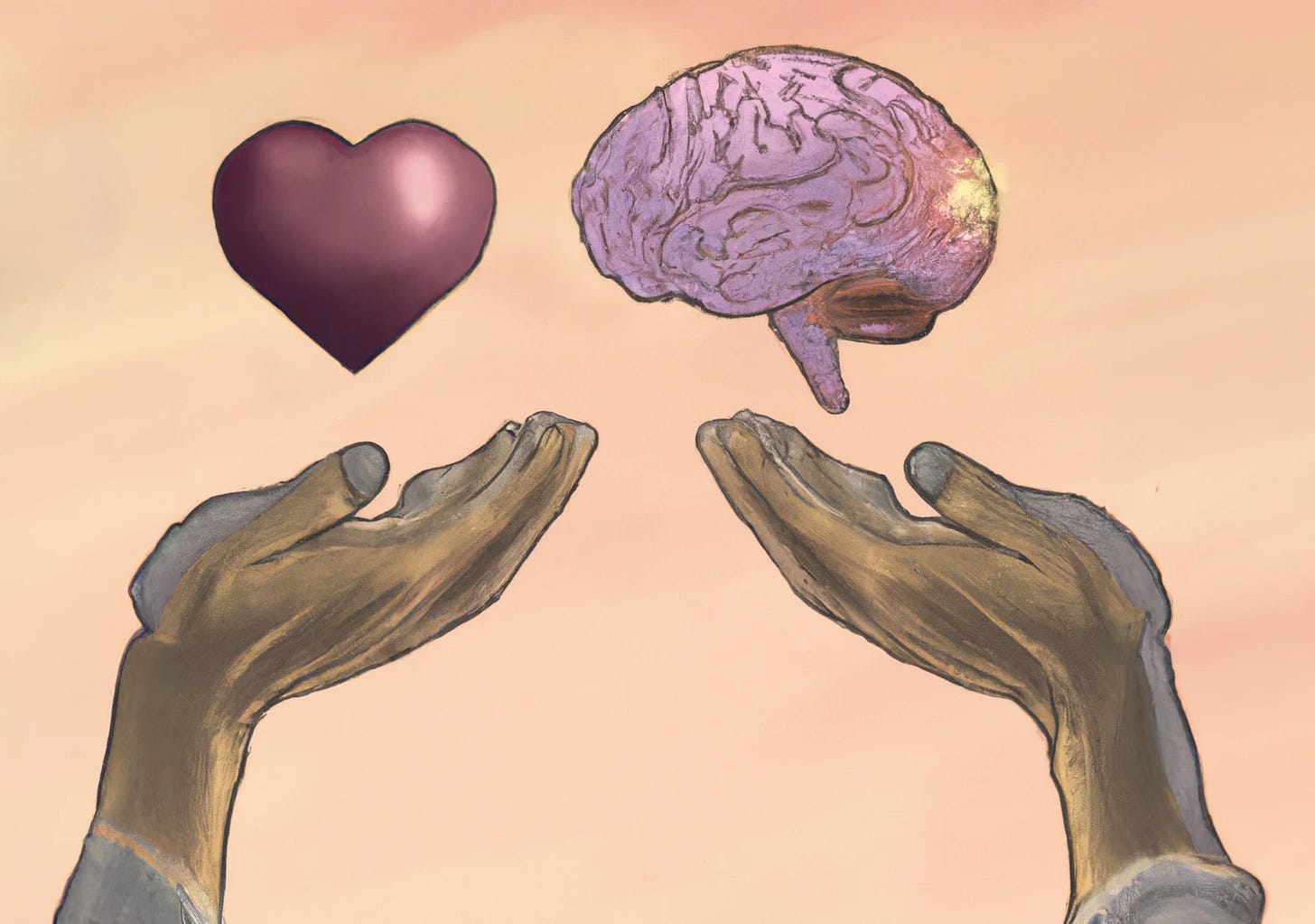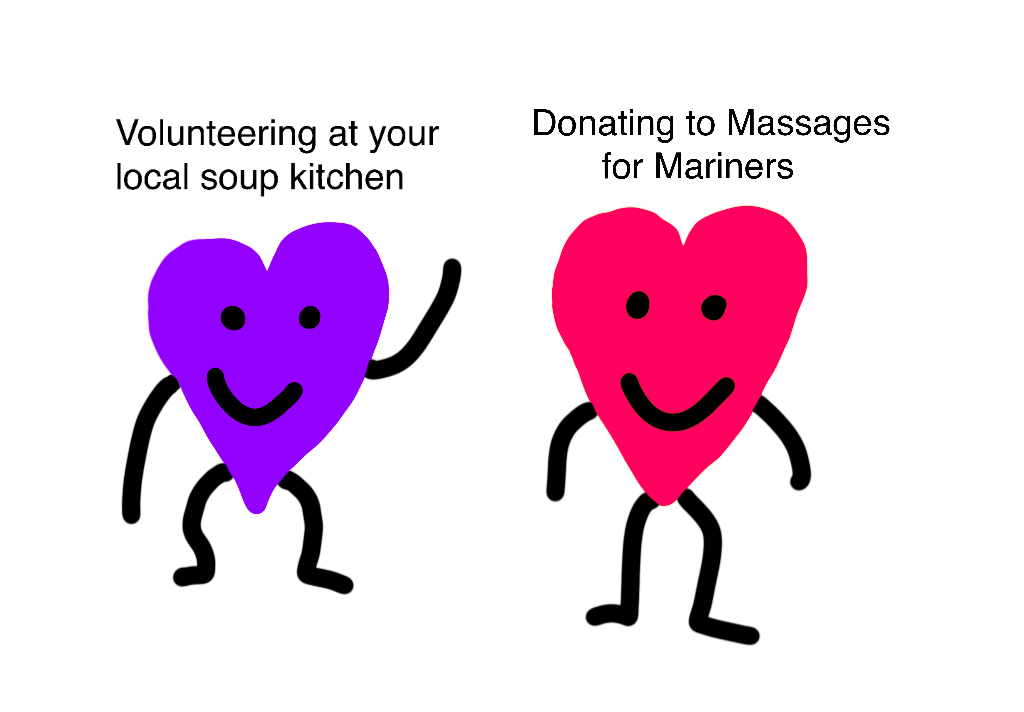My straightforward case for effective altruism
(1) We should do good things. (2) Good things often differ in how good they are. (3) It is preferable to do more good rather than less. If you agree, you might be interested in effective altruism.
TL;DR
Effective altruism is a powerful framework for doing good. The reason I find it so compelling is because I think (1) we should spend some of our time improving others’ lives, (2) the various things we can do to improve others’ lives often differ in how much good they do, and (3) it’s better to do things that do more good in the world rather than less, all else being equal. If these statements sound reasonable to you, perhaps you should look into effective altruism too!
Effective altruism is great and more people should know about it. With this blog post, I’m hoping to convince you of effective altruism as straightforwardly as possible. I’m not aiming to craft the most comprehensive case out there; instead, I’m hoping to explain in my own words why I practice effective altruism and why I think you should as well.
To do this, I will present three straightforward statements that almost entirely motivate my interest in effective altruism.
The three statements are:
At least some of our time should be spent making the world better.
The possible altruistic actions you can do differ in how much good they do in the world.
All else being equal, it is preferable to do altruistic actions that do more good in the world rather than less.
Let’s start at a high level. In my view, figuring out what it means to live a good life is one of the most important things you can do during your time on Earth.
Check out this circle I drew. Pretty cool, isn’t it? It represents the entire space of possible things you can do to pursue The Good Life. You can learn Swahili. You can become an accountant. You can learn how to play the trombone. You can attend church every Sunday. You can bake brownies and then eat them. You can subscribe to my blog. You ca— okay, you get the point. For many of us fortunate enough to be born in high-income countries, the things we can spend our time on are practically endless.
You can do a lot of things during your time on Earth. But what things should you spend your time doing to live the most fulfilling life possible? That’s a tricky philosophical question that I don’t know the answer to. But what I will say is that almost everyone agrees that one core part of living the good life involves doing some things to improve others’ lives. Y’know, making the world just a little bit better of a place to call home. The desire to do good is a significant part of being human, after all.
From these unbounded possibilities, and the innate human desire to do good, comes the first core premise of why I practice effective altruism:
1. At least some of our time should be spent making the world better.
I don’t know how much of the circle should be spent on altruistic activities. Is it 1 percent of the circle? 10 percent? 30 percent? I’m not sure, and I don’t think anyone knows definitively. But most of us can agree that some of our time should be spent altruistically.
Let’s zoom in on that altruistic slice. We can represent it as another circle that contains all the altruistic things you can do, ranging from volunteering to donating to working an impactful job.
Almost by definition, all of the things in this circle do some good in the world. But while doing any of these activities would improve others’ lives (even just by the teeniest tiniest bit in some cases), some do a lot more good in the world than others.
We’ll look at two hearts in the circle to clarify this point. The first heart represents spending your afternoon volunteering at your local soup kitchen. The second represents a $100 donation to a hypothetical charity called Massages for Mariners, which provides free massages to megayacht owners.
As strange as it sounds, a charity that provides massages for megayacht owners does some good in the world, hence why it’s included in the circle. Perhaps the burden of carrying around a massive net worth really leaves one’s back sore, so much that a nice massage would improve that billionaire’s well-being by some non-negligible amount. And perhaps the sheer absurdity of a charity whose sole existence is to give back rubs to the uber-wealthy provides some form of entertainment for the rest of us. In any case — and as wacky as it sounds — Massages for Mariners does at least a bit of good for the world.
What about volunteering at a soup kitchen? I won’t go into much detail about how it’s a good thing to help people experiencing homelessness— that seems intuitive. What also strikes me as intuitive is that spending your afternoon at a soup kitchen improves peoples’ lives more than providing a billionaire with a massage.
What follows from this intuition is the second core premise:
2. The possible altruistic actions you can do differ in how much good they do in the world.
Remember, actions only need to do some good in the world to be included in the circle. That’s a pretty easy criterion to hit. Thus, the circle contains many possible actions, from holding the door open for someone with their hands full to saving a stranger from drowning in a river to working as a scientist developing a lifesaving vaccine.
The average person in a high-income country can spend their time on many different hearts in the circle, each of which dramatically differs in how good it is for the world.
Volunteering at a soup kitchen is a good thing to do. But it’s just the beginning of how much good you can do with an afternoon. For example, you could spend the afternoon working to earn $50 that you’ll donate later. A $50 donation can do more than you might think: according to GiveWell, a charity evaluator, a $50 donation to the Against Malaria Foundation can buy roughly ten malaria nets, each of which protects approximately twenty people from a deadly disease for an average of two years.
One afternoon of yours could protect twenty people from getting sick from malaria (and perhaps far more, depending on your hourly wage). That’s incredible!
However, things get trickier when you compare altruistic actions that do not obviously differ in how much good they do in the world. Let’s look at another example to understand why it isn’t always immediately apparent which actions create a more positive impact.
A case study on HIV prevention
Suppose you have $1,000,000 that you’d like to donate to prevent people from contracting HIV. You can choose between three charities: one that distributes condoms to prevent transmission, one that provides mothers with antiretroviral therapy (so they don’t pass HIV to their newborns), and one that funds education programmes for high-risk groups such as sex workers.
You might have some intuition as to which intervention is the most effective — defined as the one that can prevent the largest number of people from contracting HIV with a given donation. But are you sure? The consequences could be enormous: by choosing the less effective charity, more people will contract HIV than if you chose the more effective option. Lives are on the line — this matters a lot!
As it turns out, educating high-risk groups is twice as effective as distributing condoms and five times as effective as antiretroviral therapy.
The differences in how much good different altruistic actions create can be enormous. The example with HIV only compared different interventions tackling the same problem. Still, the very problem itself is often one of the most important considerations when choosing where to spend your time, money, and/or energy helping others.
It’s worth taking the time to think carefully about the world’s most important problems and which specific altruistic actions you can take to make progress on them. Failing to do so might mean leaving some ‘good’ on the table, which seems like a waste.
This leads to the third and final core premise behind why I practice effective altruism:
3. All else being equal, it is preferable to do altruistic actions that do more good in the world rather than less.
That’s effective altruism in a nutshell: use evidence and careful reasoning to explore which altruistic actions within the circle do the most good and then take action based on those findings.
It’s worth explicitly mentioning that effective altruism is a set of questions — what are the world’s most important problems? How can I use my time, money, and energy to make progress on them? — not a series of rigid prescriptions.
Many effective altruists fiercely disagree with what problems we ought to work on, and what we should do once we’ve identified these problems. In fact, it is precisely these healthy disagreements that make effective altruism a powerful framework — one that uses debate, rigour, and careful reasoning to find the world’s most important problems and promising solutions for making progress on them.
Moreover, there is plenty of reasonable room for disagreement on what “good” means. In my case, I roughly consider things to be good if they, in a broad sense, increase well-being, happiness, or “utility”, for some beings with the capacity for subjective experience. You might completely disagree: perhaps other sources of moral value, such as justice and fairness, are part of your definition of good, or perhaps your moral circle is narrower than mine. That’s fine. Whatever your definition of good is, it should still follow that it’s better to do more good with your altruistic actions rather than less, all else being equal.
These three statements alone almost entirely motivate my interest in effective altruism. If they all sound reasonable to you, then perhaps effective altruism might be right for you.
Here are some next steps you can take:
Read the introduction to effective altruism article or the more thorough effective altruism handbook.
Sign up for an introductory effective altruism seminar programme.
Connect with your local effective altruism community.
Learn more about highly effective charities, and consider donating to one (or multiple) of them.
Request a free copy of an effective altruism book you find interesting.
Listen to some effective altruism podcasts.
Learn more about having an impactful career.









Thanks for writing this. It is good to get back to basics (malaria nets!) without derailing the EA trolley into things like AGI and space exploration. Not sure how you prevent those fringe(?) topics from becoming the default frame of reference when talking about EA.
"If EA had stopped there and spent their time helping improve the lives of the poorest humans on the planet, I think they would be hailed as heroes. But they didn’t stop there."
I wrote a bit more here:
https://neilscott.substack.com/p/the-alienating-affect-of-effective